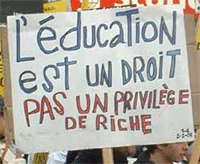
 On September 8 2000, a few weeks before the end of the 20th century and of the 2nd millennium, the United Nations General Assembly adopted the Millennium Declaration. Beyond the skepticism that this sort of action produces – how many declarations have remained in fact dead letters – the Millennium Declaration is nevertheless important. In effect, this Declaration consecrates the values that must underpin international relations in the 21st century : liberty, equality, solidarity, tolerance, respect for nature and sharing of responsibilities. Starting from here, this Declaration assigns the community of State members a certain number of objectives to attain by 2015. More
On September 8 2000, a few weeks before the end of the 20th century and of the 2nd millennium, the United Nations General Assembly adopted the Millennium Declaration. Beyond the skepticism that this sort of action produces – how many declarations have remained in fact dead letters – the Millennium Declaration is nevertheless important. In effect, this Declaration consecrates the values that must underpin international relations in the 21st century : liberty, equality, solidarity, tolerance, respect for nature and sharing of responsibilities. Starting from here, this Declaration assigns the community of State members a certain number of objectives to attain by 2015. More
 Even after having adopted the principle of free universal access to education in 1966, and ratified the contents ten years later; even after announcing, in 1990 and again in 2000, that free education could finally see the light of day, the “community of states” continues to swim in the troubled waters of amnesia and indifference. The right to education remains badly managed, submerged in the obscurity of forgotten engagements solemnly proclaimed and repeated since the adoption of the Universal Declaration of Human Rights in 1948. More
Even after having adopted the principle of free universal access to education in 1966, and ratified the contents ten years later; even after announcing, in 1990 and again in 2000, that free education could finally see the light of day, the “community of states” continues to swim in the troubled waters of amnesia and indifference. The right to education remains badly managed, submerged in the obscurity of forgotten engagements solemnly proclaimed and repeated since the adoption of the Universal Declaration of Human Rights in 1948. More
n its last summary report on Education for All (EFA), UNESCO recognizes that access to complete primary education for all in Africa presents a nuanced, if not contrasting, picture: “In 1990-91, less than half (49%) of a generation of children benefited from education up to the last year of primary school. In 2002-03, this proportion had only progressed by 10 points (59%). 4 children out of 10 still did not complete primary school in 2002-03.” More
